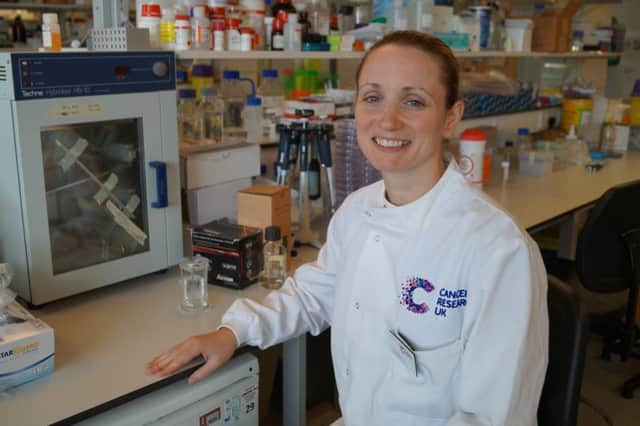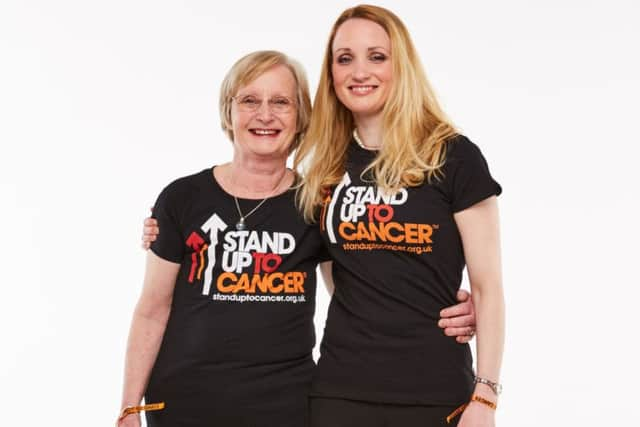Researcher with cancer gene who knows she is in race for life


Laura Wastall is in a race against time.
The Leeds breast cancer researcher has inherited a 90 per cent chance of developing the disease herself and 50 per cent chance of having passed it on to her two year old son.
Laura , 32, is the face of this year’s Stand Up To Cancer campaign, the annual collaboration between the Cancer Research UK and Channel 4. And she is joined by her mum Stephanie Gardner, 61, who has beaten breast cancer twice. Laura, who is based at the Cancer Research UK Leeds Centre, is urging men, women and children to help transform the lives of cancer patients and their families by supporting the fund-raising campaign.


Advertisement
Hide AdAdvertisement
Hide AdAfter graduation from medical school Laura’s first job was at Leeds Teaching Hospitals NHS Trust. She then became a Cancer Research UK Fellow in 2013 where she started her research into the rarer triple negative type of breast cancer.
Laura, who lives with husband Andrew in Pudsey with their two year old son, knows from personal experience just how crucial new discoveries and breakthroughs are to help people like her mum, Stephanie, survive.
Stephanie was first diagnosed with breast cancer in 1999 when the youngest of her nine children was just one year old. Laura was 15 and her mum’s diagnosis had a profound affect on the teenager and her entire family.
“My youngest sister as only one and I was in the first year of GCSEs,” recalls Laura. “It was the first time it really hit me that mum might actually die.”


Advertisement
Hide AdAdvertisement
Hide AdSix months previously Stephanie’s sister Geraldine had also been diagnosed with breast cancer and so had their mother years earlier. Stephanie’s second diagnosis was five years later. She had a further mastectomy, followed again by chemotherapy and radiotherapy. Both times she had the drug Herceptin as part of her treatment. “I don’t think I would still be here without that”, she said. Thankfully, all three have been cancer free for more than ten years.
However, it was found each of them carried the faulty BRCA1 gene mutation, as did Laura’s Uncle Dennis - Stephanie and Geraldine’s brother. Sadly Dennis passed away last month from BRCA1 related prostate cancer. And Laura has also inherited the faulty gene from her mum, a 50/50 chance, so she now faces the much higher risk of developing breast cancer herself. At the moment she attends annual cancer screening.
“My family’s experience with cancer and the work I do to study it has made me realise even more how important it is to fund research to look for more cures,” she says. “I’ve seen several patients die from cancer, but seeing the change in my uncle over the past few months has reinforced what a horrible disease cancer is to die from. I think one of the things that also upsets and worries me is that I know there is a 50/50 chance I’ve passed on the risk of this disease to my son. But hopefully, by the time he is my age, there will be many new and better ways of detecting and treating it.”
It’s this familial link to breast cancer that spurs Laura on with her research when the going gets tough and other scientists may have lost faith.
Advertisement
Hide AdAdvertisement
Hide Ad“I can get quite emotional and upset sometimes, especially when you lose a patient, you can’t help thinking ‘that could be me’. But sometimes I can take a more pragmatic approach and focus on the number of people that are cured these day.”
Some people who have the BRCA1, such as Angelina Jolie, take the decision to reduce their chances of developing cancer by having their ovaries and breasts removed.
“I know it’s something I am going to have to consider,” says Laura. “But I am only 32 and haven’t finished having my family yet.” Having children wasn’t an easy decision either for Laura and Andrew.
“We did spent a lot of time thinking about it. You want to do the best for your children. I do feel responsible and it is hard to think that he might get cancer in the future and it will be my fault.”
Advertisement
Hide AdAdvertisement
Hide AdLaura’s son will be able to find out when he is 18 if he has inherited the BRCA1 gene and he will also be given counselling.
Some of Laura’s eight siblings have had the test and have been found to have it, while others are still deciding what to do.
Stand Up To Cancer aims to accelerate the translation of brilliant scientific discoveries into innovative cancer medicine, tests and treatments. Every pound raised will help to support this progress and bring forward the day when all cancers are cured. Cancer Research UK is calling on everyone in Leeds to take a stand and do something to help raise money at work, school or at home - from fancy dress days and sponsored silences to bake sales and open mic nights.
The charity is urging people to get started right now and sign up for their free fund-raising pack which includes everything supporters need to spark creative ideas and help beat cancer sooner.
Advertisement
Hide AdAdvertisement
Hide AdNicki Embleton, Cancer Research UK spokesperson for Yorkshire, said: “We are calling on everyone in Leeds to join Laura and unite with people across the UK to stand up to this terrible disease.
“Every day, scientists and researchers like Laura work tirelessly to beat cancer, and with the support of the people of Leeds, we can continue to fund ground-breaking research to help save more lives, more quickly. The time to act is now - come together, join us and Stand Up To Cancer.”
“My research is looking at how the cancer cells and the non-cancer cells in triple negative breast cancer affect each other’s behaviour. If we can understand how they communicate with and influence each other we can block this communication, stopping the breast cancer cells from growing and invading,” says Laura.“The more money that’s raised the quicker we will get there.”
How you can Stand Up To Cancer
Launched in the UK in 2012, Stand Up To Cancer has already raised more than £25 million to fund translational research, which takes developments in the lab and transforms them into brand new tests and treatments for cancer patients.
Advertisement
Hide AdAdvertisement
Hide AdStand Up To Cancer is supported by a host of celebrities including Davina McCall, Alan Carr and Adam Hills. This year’s campaign culminates on Friday 21 October with a night of live TV on Channel 4 led by the brightest stars in film, TV and music.
People can also show their support for the campaign in style as a fun range of clothing and accessories for men, women and children.
For more information visit standuptocancer.org.uk